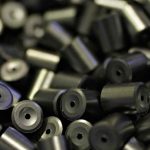The AMD Ryzen 7000 CPUs either have two or three chiplets, one or two of which are the aforementioned AMD Zen 4 CCDs fabricated on the 5nm process node, and then we have the larger die around the center which is the IOD and that is based on a 6nm process node. The AMD Ryzen 7000 CCD measures at a die size of 70mm2 compared to 83mm2 for Zen 3 and feature a total of 6.57 Billion transistors, a 58% increase over the Zen 3 CCD with 4.15 Billion transistors,
Scattered around the package are several SMDs (capacitors/resistors) that usually sit under the package substrate if we consider Intel’s CPUs. AMD is instead featuring them on the top layer and as such, they had to design a new kind of IHS which is internally referred to as the Octopus. We’ve already seen the delidded IHS before but now we get to see a final production chip with no lid on it to cover those gold Zen 4 nuggets!
With that said, the IHS is an interesting component of the AMD Ryzen 7000 Desktop CPUs. The one picture shows the arrangement of the 8 arms which Robert Hallock ‘Director of Technical Marketing at AMD’ refers to as the ‘Octopus’. Each arm has a small application of TIM beneath it which is used to solder the IHS to the interposer. Now delidding the chip is going to be really hard since each arm is right next to the massive array of capacitors. Each Arm is also slightly raised to make room for the SMDs and users shouldn’t worry about heat getting trapped beneath.
The most interesting area of the AMD Ryzen 7000 Desktop CPU IHS, besides the arms, is the gold-plated IHS which is used to increase thermal dissipation off of the CPU/IO dies and directly to the IHS. The two 5nm Zen 4 CCD’s and singular 6nm IO die have liquid-metal TIM or Thermal interface material for better heat conductivity and the aforementioned gold plating does help a lot with heat dissipation. What remains to be seen is whether the capacitors will feature silicone coating or not but from the previous package shot, it kind of looks like they do.
The thermal testing was carried out with the Corsair H1150i AIO liquid cooler:
Temperatures







